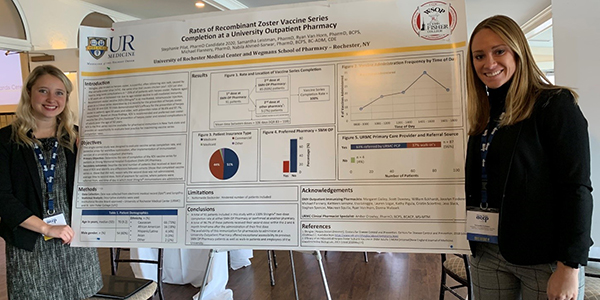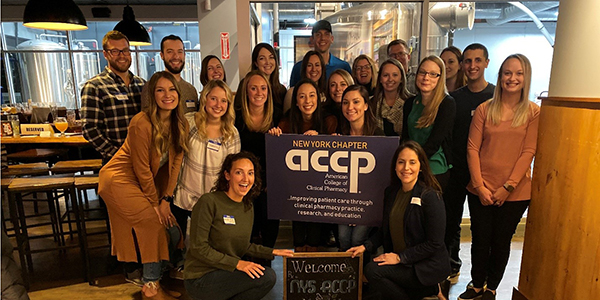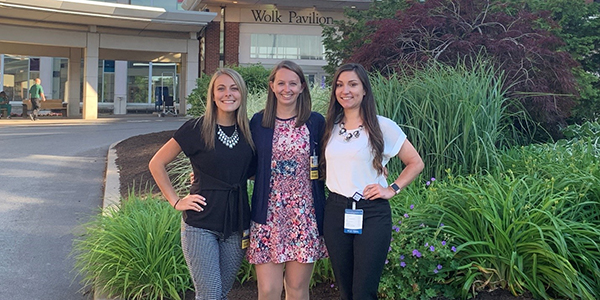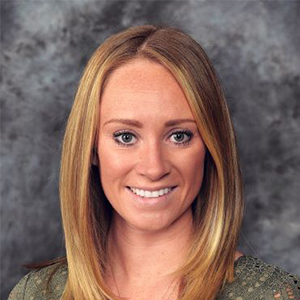PGY2 Ambulatory Care
Welcome and thank you for your interest in our PGY-2 Ambulatory Care Pharmacy Residency program at UR Medicine. Our program prides itself on developing skilled, confident pharmacists that are key members of an interdisciplinary medical team focused on working together to achieve optimal outcomes for patients. As a multi-site program, the resident with provide direct patient care to a diverse patient panel across a variety of ambulatory settings, and will be provided quality educational opportunities in a supportive working environment. Our team of ambulatory pharmacists has been growing over the past several years and clinical pharmacy services have now become an integral part of many of our outpatient clinics across the health system. The Ambulatory Care residency program has highly qualified and dedicated preceptors, majority of which are board certified, who will help to mentor the resident and ensure they are integrated into our many multidisciplinary teams. As our PGY-2 resident, you will have the opportunity to work with passionate and devoted professionals and will graduate prepared to begin your career as a clinical pharmacist in the ambulatory care setting.
On behalf of myself and our preceptors, we truly appreciate your interest in our program at the University of Rochester and we look forward to meeting you!
Our Program By the Numbers
16
16
30
+
At a Glance

Program Curriculum
Our full-time curriculum provides the essential elements needed to mold a well-rounded clinical pharmacist.

Resident Well-Being
Burnout is real. Our longitudinal programming on building resilience, finding work-life balance, and managing stress is one of the reasons residents recommend URMC.

Life of a Resident
Our emphasis on work/life balance is an important reason fellows choose URMC. A focus on trainees' well-being enables you to learn and thrive in Rochester.
Program Details
The Ambulatory Care residency program is a 12-month, full time, residency program with ASHP pre-candidate status. The program is designed to advance skills and provide essential elements to develop successful ambulatory care clinical pharmacists.
- Training in a variety of outpatient clinic settings including primary care, complex care, endocrinology, advanced heart failure, specialty pharmacy, and solid organ transplantation
- Longitudinal primary care clinic experience to promote continuity of care and give the resident the opportunity to provide consistent follow-up with their own panel of patients
- Dedicated rotations focused on developing management skills and promoting population health
- Working as part of a multidisciplinary team to manage care transitions for patients being discharged from the hospital or other acute rehabilitation facilities
- Opportunities for precepting students and residents, as well as providing education to nurses, advanced practice providers, physicians, and other pharmacists while serving as an integral part of the healthcare team
The program allows for flexibility so that elective rotations, research, and additional opportunities can all be tailored based on the resident’s clinical interests and career goals.
Rotation Schedule
The schedule below is a sample schedule for the residency year. Exact timing and selection of rotations will be tailored to meet the needs and interests of the individual interests.
Learning Experiences
- Orientation (2 Weeks)
- Primary Care (Family Medicine) (4 Weeks)
- Solid Organ Transplantation (5 Weeks)
- Population Health (5 Weeks)
- Electives (3 total, 3-4 weeks each in duration)
- Primary Care (Highland Family Medicine - Medical Resident Training Site) (4 Weeks)
- Specialty Pharmacy (can choose specific clinical area based on resident interests) (5 Weeks)
- Specialty Lite – Endocrinology (5 Weeks)
- Ambulatory Pharmacy Management (4 Weeks)
- Primary Care (Internal Medicine) (4 Weeks)
- Elective (3 Weeks)
- Wrap-up (1 Week)
Longitudinal Rotations
- Continuity of Care – the resident will spend 0.5-1 day/week (Friday) in the same Primary Care Clinic (can choose specific clinic based on resident interests and preceptor availability) to establish themselves with the providers and staff and follow a panel of patients longitudinally
- Presentations and Teaching
- Research/Quality Improvement
Elective Rotation Options
- Specialty pharmacy (any clinical area not already done as part of core rotations)
- Long Term Care
- Transitions of Care / Inpatient Internal Medicine
- Academia
- Investigational Drug Service
- Ambulatory Surgery Center
- Complex Care Center
Additional Opportunities and Research
- Business Improvement Plan – The resident will assess current workflows and departmental needs in order to develop a business improvement plan that will be submitted for approval by the end of the residency year.
- Research – Resident will conduct both a quality improvement and major research project. Research project results will be presented at a national meeting and submitted for publication.
- Presentations and Precepting – The resident will have opportunities to develop teaching skills by providing presentations to both the pharmacy staff as well as faculty, residents, and students in other health care professions both locally and regionally.
- 1 platform presentation and 1 CE required during the year (additional presentations will be assigned as deemed necessary)
- 4 Journal Club Presentations per year (quarterly)
- Will have at least 1 rotation where resident will serve as lead preceptor to a PGY1 resident and/or APPE student
- Teaching Certificate (if not completed during PGY1 residency)
- Meeting Attendance – The resident will receive funding to attend 1 National Meeting, the NYS ACCP Annual Meeting, and UB Resident Research Day.
Resident Well-Being
We place tremendous value on resident well-being and offer a longitudinal series which helps our residents achieve a better work-life balance. We strive to provide our residents with the skills they need to manage their stress and build resilience, not only for residency training, but for their professional careers.
Sessions incorporate guest speakers, various icebreaker activities, events such as preceptor-resident get-togethers, and lots of fun!
Topics covered include:
- Understanding Wellness, Resilience, and Burnout
- Developing Self-Care Strategies as a Resident
- Understand Factors That Can Contribute to Burnout
- Handling Conflict and Difficult Conversations
- Creating a Culture of Resident Well-Being
Life of a Resident
- 7:30 a.m. Arrive at clinic.
- 7:30 - 8:30 a.m. Review patients, respond to emails, and prepare for the day.
- 8:30 - 9:00 a.m. Discuss patients for the day with preceptor.
- 9:00 - 12:00 p.m. Patient visits (in-person or via telehealth) to provide Comprehensive Medication Management services, communicate recommendations to attending providers, answer medication-related questions from providers and clinical staff PRN.
- 12:00 - 1:00 p.m. Enjoy lunch, take a walk outside, and follow-up on any miscellaneous personal tasks.
- 1:00 - 4:00 p.m. Patient visits (in-person or via telehealth) to provide Comprehensive Medication Management services, communicate recommendations to attending providers, answer medication-related questions from providers and clinical staff PRN. Attend any meetings that may be scheduled.
- 4:00 - 4:30 p.m. Finish up any outstanding documentation within the EMR.
- 4:30 - 5:00 p.m. Determine which patients on clinic schedule for the next day would most benefit from clinical pharmacist involvement and wrap-up with preceptor.
- 5:00 p.m. Head home and enjoy your night! Things residents might work on at home include: working up patients for the next day, topic discussions, journal clubs, research and other non-rotation related projects.
*Schedule will vary depending on the rotation the resident is on during the year.
Purpose Statement
A PGY2 pharmacy residency program builds on Doctor of Pharmacy (PharmD) education and PGY1 pharmacy residency training to contribute to the development of clinical pharmacists in specialized areas of practice. PGY2 residencies provide residents with opportunities to function independently as practitioners by conceptualizing and integrating accumulated experience and knowledge and incorporating both into the provision of patient care or other advanced practice settings. Residents who successfully complete an accredited PGY2 pharmacy residency are prepared for advanced patient care, academic, or other specialized positions, along with board certification.
This PGY2 residency program in Ambulatory Care is intended to develop the knowledge, skills and abilities of a qualified pharmacist that are necessary to be an expert clinical pharmacy practitioner in the ambulatory setting. It is intended that a graduate of this program will be fully qualified to develop and sustain an independent and successful clinical pharmacy practice in any ambulatory clinical setting.
Contact Us

Samantha Heacock, PharmD, BCACP, BC-ADM
Director | PGY2 Ambulatory Care Residency Program
Clinical Pharmacy Specialist - Primary Care
University of Rochester Medical Center
601 Elmwood Avenue, Box 638
Rochester, NY 14642
Office: (585) 602-6123